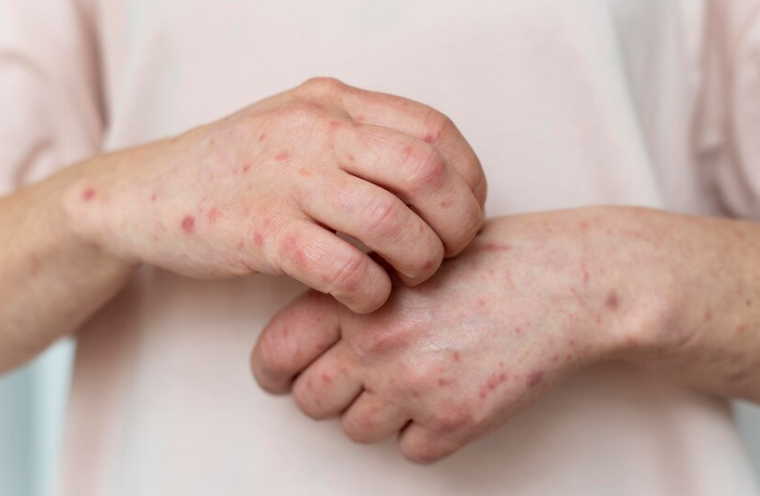Think of a situation when a disease is too easy to diagnose but complex to deal with.
Dealing with a complicated ailment can be daunting. On the one hand, you know the issue and the chain of action, which can help you to recover to some extent, but at the same time, you also see the complexity of the ailment and hardships that come along with it.
It’s like you cannot live with the hardships of an ailment, and you don’t know what you need to do to recover.
Psoriasis is one of those ailments that is easy to diagnose but can also be quite challenging to deal with or recover from. Let’s understand more about it.
Psoriasis:
Psoriasis is a skin disease that causes rashes and scaly patches. It is an autoimmune condition caused by an overactive immune system.
Skin is the largest organ in our body, which protects us from harmful germs entering our body. It also regulates body temperature and performs various essential functions. In a healthy body, we continuously shed old skin cells, replaced by new cells. Our usual skin cycle is between 5 and 6 weeks, depending on age. However, in people with Psoriasis, their body starts to produce new skin cells in just 4-5 days, which doesn’t give the body enough time to dispose of old cells, resulting in layers of skin. It then becomes swollen, red, itchy, inflamed, and brittle; it bleeds as well. It affects mainly the upper body, knees, ankles, elbow, face, and scalp.
Psoriasis is a skin issue, but it affects the whole body, physically and emotionally. It results in poor sleep quality, and people who have Psoriasis are more prone to depression.
What causes Psoriasis?
It is not fully clear what causes Psoriasis. However, genes, environmental factors, infections, injuries, poor lifestyle, smoking, stress, and the consumption of a few medicines could be the reason behind psoriasis flare-ups.
Lifestyle changes to implement:
It is a chronic and long-term ailment that requires lots of patience and a changed lifestyle, which one needs to follow forever.
- Diet :
Psoriasis has a strong link between gut health and inflammation. Improving gut health, avoiding inflammatory food and consuming an anti-inflammatory diet can help reduce psoriasis flare-ups.
You can get a CRP (C-reactive protein) test to know the level of inflammation in the blood. It is an inflammatory marker which shows inflammation in the body. A higher number represents high inflammation in the body.
Inflammatory food to avoid:
– Milk and milk products
– Food made with refined carbohydrates (maida)
– Gluten
– Food with added sugar
– Food containing saturated fat and transfat
– Alcohol
– Stop smoking
Anti-inflammatory food to consume:
– Healthy fats (avocado, nuts and seeds)
– Fish made in a healthy way
– Poultry
– Plant-based protein (tofu, tempeh, edamame)
– Lentil, legumes & pulses
– Fruits
– Vegetables
– Olive oil
– Whole grains
Psoriasis affects people differently. What works for one might not work for another. One needs to experiment and see what is not suitable for their body. Overall, the focus should be on eating clean and homemade food and food containing additives (red meat, sweet desserts, commercial food items) should be avoided.
To improve gut health, one can focus on consuming a varied diet and adding probiotics to increase good gut bacteria. Yoghurt and buttermilk made from low-fat milk, kefir, kombucha, and kanji are a few examples.
- Superfood:
Consumption of some supplements is likely to benefit people with Psoriasis. One can start consuming after consulting a healthcare provider or doctor. It includes;
– Curcumin
– Vitamin D
– Omega 3
– Probiotics
- The connection between sore throat and tonsilitis:
People with Psoriasis often suffer from frequent sore throat episodes. A few studies have mentioned the connection between Psoriasis and tonsillitis, and it was mentioned that removing tonsils (a tonsillectomy) has helped reduce psoriasis flare-ups in some patients.
One needs to discuss with their ENT and take suggestive action.
- Itch-scratch cycle:
The itch-scratch cycle refers to a condition in which people experience extreme itchiness, which makes them scratch repetitively. That, in turn, increases inflammation, which doesn’t allow the skin to heal completely, ultimately leading to increased itchiness. The itch-scratch cycle is tough to break but needs to be worked on to recover.
People with Psoriasis suffer from extreme itchiness, which puts them in the same cycle. One needs to focus on reducing flare-ups by following an anti-inflammatory diet to break this cycle. Applying topical anti-itch cream/ointment to the skin may also help. Consult a dermatologist before using any cream.
- Mental health:
Psoriasis affects their physical appearance, which can reduce their confidence level, disrupt social life and push them into depression. One should focus on improving mental health by adding exercise, breathing exercises, meditation, gratitude exercises, laughing clubs, and mingling with loved ones.
As mentioned above, Psoriasis is one of those ailments that is quite challenging to deal with. It isn’t easy to pinpoint the exact cause behind flare-ups, and it is equally difficult to find out what works to recover, but a few points are worth remembering.
– It’s more on bio-individuality. One needs to focus on things which are suitable for them.
– It can take a long time to understand what works.
– With the proper treatment, it is possible to reduce/recover from skin lesions.
– It can be a lifelong condition. Sticking to diet and lifestyle changes that give noticeable results is advisable.
Thank you.

